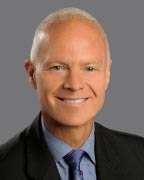
As anyone who attended Music Theater Works’ Frank Loesser’s “How to Succeed in Business Without Really Trying” recently learned, company co-founder and general manager Bridget McDonough and artistic director Rudy Hogenmiller announced they are making this 39th season their last one at the rudder.
They also introduced producing artistic director designate Kyle Dougan who will step into a new position that combines their two job descriptions so that audiences know Music Theater Works will continue when they step down.
What audiences may not know are the back stories.
In separate phone interviews, Chicago Theater and Arts, chatted with McDonogh and Hogenmiller about the double retirement, the company’s name change to Music Theater Works from Light Opera Works, how shows were chosen and the company’s unusual schedule of three summer-fall shows of two-weekends each.

Bridget McDonough
Even though she was off to Italy for a well-deserved vacation, McDonough was easy to talk with while waiting for her boarding call.
After graduation from Northwestern University in 1978 she had stayed in touch with alum when Philip Kraus and a few others talked about what would become Light Opera Works in 1980.
“I co-founded it with Phil Kraus. It was his idea to start a professional company that would do mostly operetta. There were the two of us and four others.”
What was important to them was a venue that would do justice to the music.
“We wanted space for a full orchestra for the operettas. As alums we were able to get Cahn Auditorium. Some were in the School of Music, others, in Theater in the School of Speech.”
They opened with “H.M.S. Pinafore” on Sept. 10, 1981,
“We were doing French, British and American operettas and did some musicals in the early years but mostly operettas.”
Light Opera Works continued to add more musicals so that 38 years after their first production, they changed the name to Music Theater Works.
“We have a very loyal audience but as time passed, audiences for operettas dwindled. We did more classical musicals and some contemporary.”
No matter the offerings though they still believed it was important to have a full orchestra. All the group’s production materials including the program say “Full Orchestra.” And Cahn which has decent acoustics and space for the musicians worked well.
“Cahn holds 1000 seats. For a big proscenium it’s still intimate. No one is too far from the stage.”
The current season that began with “How to Succeed,” (June) continues with Alan Menken and Stephen Schwartz’s “The Hunchback of Notre Dame,” Aug. 17-25, followed by “Lerner and Loewe’s Greatest Hits,” Oct. 4-13 (Nichols Hall) and ends with “Joseph and the Amazing Technicolor Dreamcoat, Dec 21-31, offers something for everyone.
“This is our 39th season. We try to have a balance. First, we have to see what titles are available then try to balance the shows. We like to mix well known works with those not performed as often. Also, there is the cost of a show, Expensive is balanced with one that is not quite as costly. The whole staff discusses it.”
As to what is coming, she and Hogenmiller say Dougan is working on that now. However, she is ready to travel and have a break.
“ I was thinking about it. Rudy said he was thinking about it for the end of 2019 because he turns 65 in January. I need a break. I haven’t had one in a long time.”
“And this way the transition is clean. We can combine our jobs into one. Kyle has been here working on the shows for the past five years but there will be more guest directors. It is difficult to direct and run everything.”

Rudy Hogenmiller
Music Theater Works artistic director followed a different path to what was Light Opera Works. Before coming on board in 2005 Hogenmiller was in demand as an actor, choreographer, dancer and director in Chicago area theaters and he toured internationally as a dancer in “A Chorus Line,” “Evita” and “The Fantasticks.”
“It was not in my wheel house to do operettas and Gilbert and Sullivan.”
However, operettas, and Gilbert and Sullivan were part of Light Opera Works as well as a building trend to classical and contemporary musicals. But now he is ready for a different life.
“I don’t want to be on some schedule. I want to be free. My partner retired a few years ago . We have a place in the country south of Chicago. I will garden. I have home projects. I have no big desire to travel now. We’ve traveled a lot in our careers.”
Listening to Hogenmiller about everything that goes into formulating a season is a fascinating look at how titles and royalties play a part (pun intended).
“Planning the season is one of the most difficult jobs. It’s definitely a a challenge. Years ago, we pretty much did operettas and some unusual musicals…But I think the operetta audience has gotten smaller and smaller and more and more cost prohibitive.”
“Before my time they had corporate funding. That went away and the company relies now on individual donors and some grants and some foundations. But we’re doing pretty well. A lot of people do like us.”
The expansion of Chicago area theaters adding musicals to their season has made a difference in what shows are available to Music Theater Works which is limited to summer, fall and winter holidays when Cahn Auditorium is available. Revues tend to be performed at Nichols Hall, also an Evanston venue.
“There is so much more entertainment out there now. Our run is short. Once in a while like in August, we’ll do 3 weekends but that is risky (cost) Kyle might be more likely to take a chance.”
He tried to have a variety of shows in a season but then getting the license to a show he wanted might be a problem because royalties for a company whose shows fit between two weekends wouldn’t look as attractive as a longer run.
“In the past we used to do three operettas. Now there’s more variety. We sit down with staff and talk about what we’d like to do, whether it would be a good seller, we can’t afford to have a flop and we like to have a balance.”
“Now our genre is more main stream. We had a niche. That changed, Now we’re another theater doing musicals in town and we’re all going for rights to the same shows.”
“I would call the license house. I wanted “West Side Story” then found that the Lyric had tied it up for years in advance. In other instances a touring company would be coming to town. When you lose a couple of titles you have to change the plan.”
That happened this season.
“I was interested in “Pajama Game” for this year. It’s a fun summer show with good songs but couldn’t get it. But so is “How to Scucceed” though the ladies might object to some of it. It is very 60’s but it is a satire.”
“Maybe it (“Pajama Game”) was appearing somewhere else or going to. Or sometimes I can’t get a show because Goodman which has also added musicals, or Marriott, is interested and they have longer runs.
He noted that “Chorus Line was not a problem because rights had been released in the 1980s.
“Any theater could do it, Marriott, Candlelight, Oakbrook. There were two theaters doing it about the same time.”
“Royalties come into play. If a show has no royalties that can save $20,000. It can be a huge savings.”
Hogenmiller attributes the choice of “Hunchback” this season to business manager Michael Kotze.
“We stumbled upon it. Our business manager was going to see it in Frankfort (Illinois) at a high school. He called and said you have to see this. I went. It was fantastic; huge set, epic show, tragic, love story. There’s a couple, maybe three songs, you walk away remembering but almost all the show is music.”
“It’s good, challenging and very big. There’s a separate choir on stage that represents the choir in the cathedral. You hear them almost as much as the orchestra. It is close to opera, a big serious show.”
The other choice was “Brigadoon” which interested McDonough. Instead, some of its music will be featured in “Lerner and Loewe’s Greatest Hits” a revue in October.
“Joseph” ends the season and Hogenmiller’s term.
“I wanted to do Annie. I’ve been trying for years but could not get the rights.“ So we’re doing “Joseph.” It is a family show. It’s Clayton’s show (choreographer Clayton Cross). It’s mostly dancing. I won’t have to do much. I mentored Clayton. He’s my right-hand man.”
When complimented on Music Theater’s “Mame,” an exceptional production done the way its writers likely envisioned it, Hogenmiller summed up his philosophy.
“I do not want to reinvent a show. If I love it, I want to honor it for what it is. It’s not my style to reinvent.”
Jodie Jacobs
